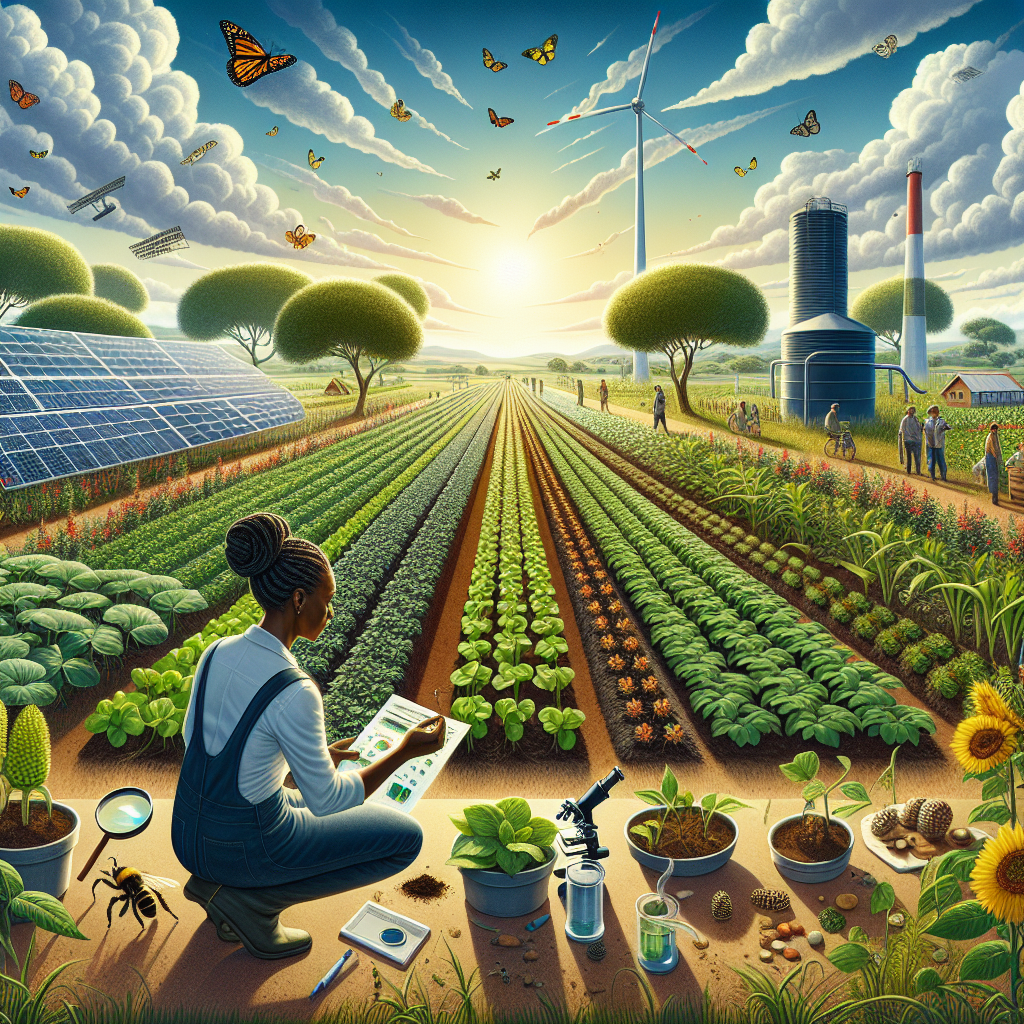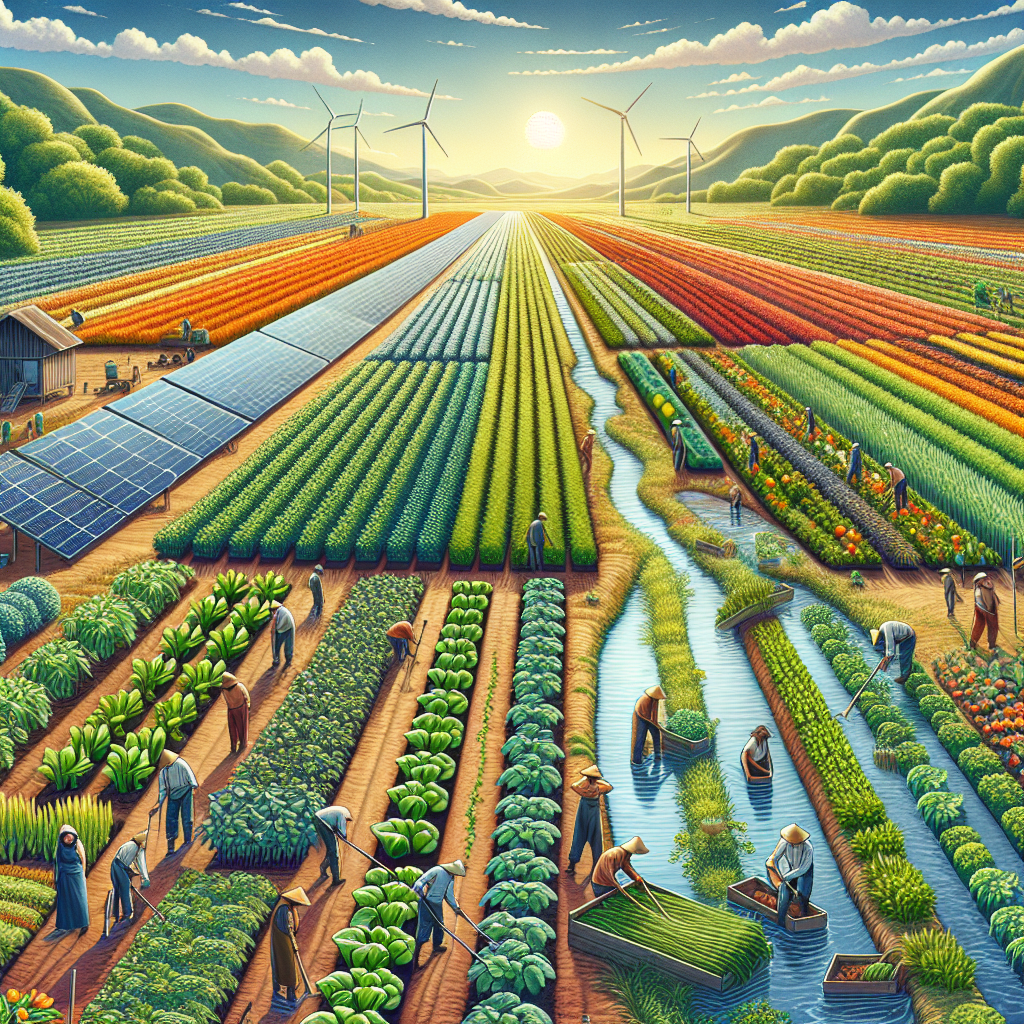Welcome to a world where we can both preserve our food security and protect the environment. In this paper you will explore the concept of sustainable agriculture, its importance and its fundamental contribution to food security and environmental protection. You will find out how traditional farming methods are damaging our environment and what role sustainable agriculture plays in solving these problems.
We will also discuss the challenges encountered in implementing sustainable agricultural practices and present case studies of successful projects in this area. Finally, you will get an overview of current policies and subsidies and we will look at future perspectives and opportunities for sustainable agriculture. Our aim is to raise awareness of this crucial aspect of environmental protection and food security. Immerse yourself with us in the fascinating world of sustainable agriculture!
Definition and importance of sustainable agriculture
Sustainable agriculture is a concept that goes beyond the mere production of food. It encompasses a diverse mix of methods and practices that aim to protect the environment, ecosystems and natural resources while ensuring a safe and sufficient food supply.
Sustainable farming means that you, as a farmer, manage your farm in a way that ensures the long-term fertility of the soil, preserves biodiversity and conserves water resources. It also means considering the welfare of animals and contributing to the well-being of rural communities.
A key feature of sustainable agriculture is that it endeavours to strike a balance between the production of food and the protection of the natural environment. It seeks to minimise the negative impact of agriculture on the environment while maximising productivity and food supply. In this way, it plays an important role in combating hunger and malnutrition worldwide without harming the environment.
Environmental impact of traditional farming methods

Traditional farming methods have helped to feed the world’s growing population over the last few centuries. But you need to know that they also have a significant impact on the environment.
First of all, the massive use of pesticides and fertilisers in conventional agriculture has significantly impaired soil quality. The chemicals not only kill pests and weeds, but also affect microorganisms that are crucial for soil fertility. Furthermore, these chemicals can end up in our water sources and lead to pollution of rivers and oceans, which in turn affects aquatic life and the people who use these waters.
In addition, traditional farming methods often lead to deforestation and land degradation. Forests are cleared to gain more arable land, which not only means the loss of habitat for many animal species, but also results in fewer trees to absorb CO2.
Intensive livestock farming, another important component of traditional agriculture, also causes significant environmental problems. It is a major contributor to global warming as it produces large amounts of methane, a potent greenhouse gas. Livestock farming also requires a lot of land and water and contributes to air, soil and water pollution.
Overall, we can say that traditional agriculture has a significant impact on the environment, from the pollution of our waters and soils to deforestation and global warming. It is therefore of the utmost importance to develop and utilise more sustainable farming methods.
The role of sustainable agriculture in food security
Sustainable agriculture plays a crucial role in ensuring food security worldwide. It encompasses practices and techniques that aim to protect biodiversity, conserve natural resources and protect the climate, while ensuring productive harvests.
Why is this so important? You have to remember that the global population continues to grow and so does the demand for food. Sustainable agriculture helps to meet this demand without compromising future food production. And it goes even further: by involving local communities and small farmers, it recognises and promotes the diversity of agricultural systems and is thus able to strengthen the local economy and create jobs.
Another important aspect is adaptability: sustainable agriculture can help to increase resilience to climate change and other environmental pressures. This is particularly important in regions that are already suffering from the consequences of climate change. Adaptive practices such as agroforestry, terracing or water-saving irrigation methods can help to ensure food security for these communities.
Sustainable agriculture is therefore not only an effective means of combating climate change, but also a powerful strategy for ensuring global food security.
The role of sustainable agriculture in environmental protection
Sustainable agriculture plays a crucial role in protecting the environment because, unlike conventional farming methods, it strives for a constant balance with nature. To achieve this, sustainable agriculture utilises a variety of methods and practices that focus on reducing environmental impacts.
Firstly, sustainable agriculture aims to preserve and promote biodiversity. By preserving biodiversity on your farm, you create a more stable ecosystem that is less susceptible to disease and pests, thus reducing the use of pesticides and other chemical inputs.
Secondly, sustainable agriculture focuses on keeping the soil healthy and fertile. This is achieved through the use of methods such as crop rotation, composting and the use of green manure. Healthy, nutrient-rich soil is not only more productive, but also helps to keep water clean as it is less likely to cause erosion and leaching of nutrients.
Thirdly, water is another important factor in environmental protection, and sustainable agriculture emphasises efficient water management. This means irrigating fields when necessary, rather than on a set schedule, and using techniques such as drip irrigation and mulching to maximise water efficiency and minimise water pollution.
In conclusion, sustainable agriculture encourages farmers to act locally and think globally about their impact on the environment. If a farm has high greenhouse gas emissions – for example through the use of artificial fertilisers – this has a global impact on the climate. Sustainable agriculture therefore also focuses on climate protection by trying to minimise the carbon footprint.
By following these principles as a farmer, you can help protect the environment while running a sustainable, productive business.
Challenges in implementing sustainable farming practices
The transition to more sustainable farming poses major challenges for both farmers and society as a whole. Farmers often fear that switching to sustainable practices could jeopardise their yields and thus their livelihoods. This is often due to the fact that sustainable farming methods can initially be more costly to implement and require higher investments. Technologies to improve efficiency and minimise resource use are becoming more affordable and accessible, but there remains an initial hurdle.
There is also a lack of knowledge and awareness of sustainable techniques and practices among farmers and consumers. Many are unaware of the impact that traditional farming methods can have on the environment and the benefits of sustainable farming. Effective communication and education are therefore essential components in the transition to more sustainable practices.
Furthermore, unfavourable policy frameworks can hinder the advancement of sustainable agriculture. For example, some countries lack clear guidelines and action plans to promote sustainable agriculture. Without government support and political backing, the implementation of sustainable farming practices can be more difficult.
Finally, public opinion and consumer buying behaviour can also pose a challenge. Although many people express a desire for more sustainable products, this is not always reflected in their actual purchasing behaviour. Social change is therefore also needed to increase the demand for sustainably produced food and thus incentivise farmers to make the switch.
Case studies of successful sustainable farming projects
There are many examples of the successful application of sustainable agriculture around the world. Here we look at two particular projects.
The first example is the Sustaining Agriculture through Innovative Research (SAIR) project in Kenya. SAIR is an initiative to promote practices that both increase agricultural productivity and reduce the environmental footprint of agricultural activities. In practice, this includes the application of water and soil conservation technologies, the use of organic fertilisers and the implementation of farming practices that minimise soil erosion. The project has achieved a significant increase in agricultural productivity in the region, while at the same time reducing water consumption and the use of chemical fertilisers.
Another impressive example of sustainable agriculture is Green Care Farming in the Netherlands. This model combines agriculture with social care and offers people with special needs the opportunity to actively participate in agricultural activities. The farms use natural resources sustainably, endeavour to ensure animal welfare and produce high-quality food. At the same time, they offer meaningful employment opportunities and help to minimise social exclusion.
These projects illustrate that sustainable agriculture is not only crucial for our planet and food security, but can also provide multiple social benefits. Furthermore, they show that such practices are not only feasible in theory, but that they are already being successfully implemented.
Current policy measures and funding
In an effort to make agriculture more sustainable and environmentally friendly, various governments around the world have taken a number of measures and provided subsidies. While these measures vary greatly in scope and nature, they share the common goal of encouraging farmers to adopt sustainable practices.
One of the most notable policies is the European Union’s Common Agricultural Policy (CAP), which links direct payments to farmers to environmental and climate protection measures. The aim is to promote sustainable agriculture while ensuring food security.
Some countries, including Germany and the Netherlands, have introduced national strategies for sustainability in agriculture, which include subsidies for organic farming, improving soil quality and protecting biodiversity. They also provide training and technical support to farmers to help them implement sustainable practices.
In the USA, the Department of Agriculture (USDA) has launched various support programmes to promote sustainable farming practices. These include grants and loan guarantees for sustainable agriculture projects, technical assistance and research and development funds for sustainable agricultural technologies.
You can expect these policies and grants to continue to play a critical role in encouraging farmers to adopt sustainable practices and reducing agriculture’s negative impact on the environment.
Future prospects and opportunities for sustainable agriculture
Sustainable agriculture undoubtedly has a bright future and offers diverse opportunities. Forecasts suggest that the need and awareness of sustainable farming practices will increase in the coming years.
Technology will play a key role in shaping the sustainable agriculture of the future. Innovative techniques such as precision farming, which minimises the use of chemicals and maximises yields, could be increasingly used. Other technologies such as drones could be used to monitor plant growth and detect diseases at an early stage, ensuring yield while minimising environmental impact.
Urbanisation could provide another opportunity for sustainable agriculture. As urban populations grow, the demand for locally produced, fresh food will increase. Urban gardening and vertical farming could help to meet this demand while improving the carbon footprint by reducing transport distances.
Ultimately, you as an individual can also help to promote sustainable agriculture. Every purchase of sustainably produced food sends a signal to farmers and retailers that sustainability is an important purchasing criterion. You could also start producing food sustainably in your own garden or on your balcony and thus help to put sustainable agriculture into practice.
It’s clear that there are a lot of challenges, but also a lot of opportunities. With the right support and commitment from everyone involved, sustainable agriculture can help us both meet our food needs and protect our environment.



